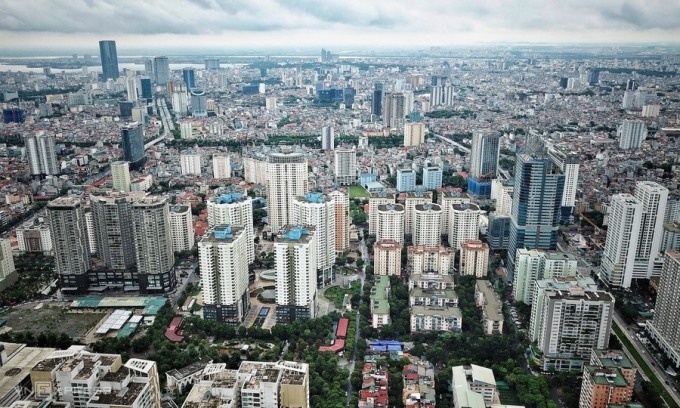
The Central Resolution requires a higher tax rate for people who use a lot of land, houses, speculate on land, slow to use or leave unused land.
The Central Committee of the Party has just issued Resolution No. 18 on continuing to renovate and perfect institutions and policies, improve the effectiveness and efficiency of land management and use, and create a driving force for Vietnam to become a country in the world. high-income development.
The resolution stated that land is a great resource that needs to be promoted, managed and used effectively, sustainably, ensuring social justice; do not let land be degraded, destroyed, wasted, corrupt, negative. In order to free up resources, the financial policy on land must harmonize the interests of the State, land users and investors; have an effective mechanism to regulate revenue from land use levy and land rent between the central and local governments, and study policies to regulate the difference in land rent.
The Central Government requires agencies to develop policies and laws on land use tax according to international practices, suitable to the level of development, specific conditions and appropriate roadmap. In addition to stipulating higher tax rates for some of the above groups, it is necessary to have tax incentives, land use levies, and land rents suitable to the fields and areas eligible for investment incentives; for poor households, ethnic minorities, and families of people with meritorious services to the revolution. Tax incentives should also be applied to localities where production is planned to ensure national food security and protect forests, especially protection forests and special-use forests.
The issue of completing legal regulations related to the real estate market, in which the commercialization of land use rights will be promoted. The real estate market information system is built in association with land information; adopt policies to encourage the development of the land use right market, especially the agricultural land rental market.
"Completing the legal basis and strengthening the implementation of non-cash payments in real estate transactions; having a mechanism to ensure the healthy, safe and sustainable development of the real estate market; strictly controlling , overcome the situation of land speculation", the Central Government requested.
In addition, the content of land use planning must combine the criteria of land types associated with space, use zoning, and natural ecosystems, "showing information to each land plot". The determination of land use norms must be suitable to the use needs, avoiding waste in allocation, management and use. Clearly and strictly regulate the approval and issuance of annual land use plans as well as cases of land allocation and land lease without auction.

Houses and apartments in Hanoi. Photo: Giang Huy
According to Resolution 18, land recovery can only be carried out after the compensation, support and resettlement plan is approved. In case of land recovery and resettlement, resettlement arrangements must be completed first, ensuring that after land recovery, people have a place to live and have a life equal to or better than the old place.
The Central Government also raised the issue of more specific regulations on the authority, purpose and scope of land recovery; specific conditions and criteria for land recovery by the State for socio-economic development for national and public interests; the self-agreement mechanism between people and businesses in the transfer of land use rights for the implementation of urban and commercial housing projects will continue to be implemented.
Land used by organizations, state agencies and non-business units for improper purposes, especially in advantageous positions with high profitability, will be resolutely recovered.
The Central Government also decided to remove the land price bracket. Agencies have mechanisms and methods to determine land prices according to market principles; stipulate the functions, tasks and responsibilities of the land price determination agency.
The Central Government shall develop criteria and procedures for inspecting and supervising localities in formulating land price lists. Provincial People's Councils decide and supervise the implementation of land prices. Land Price Appraisal Council; consulting organizations determine land prices, the capacity and ethics of the appraisers are guaranteed independence. Some regulations to ensure transparency will be added such as: publicizing land prices; compulsory trading through the exchange; pay via bank, no cash...
The resolution stated the point of view that land belongs to the entire people, and the State is the representative of the owner and uniformly manages it. The State exercises the rights of the owner through master plans and plans on land use; recover land, allocate land, lease land, recognize land use rights, permit change of use purpose and stipulate land use term; decide on land prices; policy decisions to regulate the value added from land that is not created by land users.
The State recovers land to use for defense and security purposes; socio-economic development for national and public interests in accordance with the law, ensuring fairness and transparency, and upholding accountability. Land management and use must ensure the common interests of the entire people; People are given favorable conditions to access and use land fairly.
Land use rights are a special type of property and goods but are not ownership rights; land use rights and land-attached assets are protected by law. The land policy will be completed synchronously, in line with the institutional development of the market economy; adopt policies suitable to each type of land use in order to maximize the value of land resources; overcome corruption, negativity, lawsuits, speculation and wasteful land use.
Land must be fully investigated, assessed, statistic, inventoryed, quantified and accounted for in the economy; are planned to use effectively and rationally with a long-term vision.
The Central Government requests that by 2023, the amendments to the 2013 Land Law and a number of related laws will be completed. By 2030, the legal system on land will be completed synchronously, unify, and overcome the state of wasteful land use, fallow, pollution and degradation; problems in land management and use left by history...